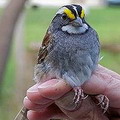 隨著美國東岸的氣候日漸趨暖,許多春天遷徙到麻賽諸塞州的鳥類也提早了北返的時間。其中一些種類甚至遠從南美洲飛越千里而來,然而由麻州科學家提出的一項最新研究顯示,鳥種的遷徙距離越長,越難適應變化快速的氣候。長途遷徙的鳥類跟不上暖化的腳步,其生態可能會受到嚴重影響。
隨著美國東岸的氣候日漸趨暖,許多春天遷徙到麻賽諸塞州的鳥類也提早了北返的時間。其中一些種類甚至遠從南美洲飛越千里而來,然而由麻州科學家提出的一項最新研究顯示,鳥種的遷徙距離越長,越難適應變化快速的氣候。長途遷徙的鳥類跟不上暖化的腳步,其生態可能會受到嚴重影響。
波士頓大學與曼諾勉(Manomet)保育科學中心的研究人員收集了1970年以來的繫放資料,分析麻州東部沿海32種鳥類的春季遷徙時間變化。繫放工作是用特別的細網捕捉鳥類,繫上腳環再予以釋放,曼諾勉中心從1966年開始持續進行繫放,是北美歷史最悠久、規模最大的陸地鳥類繫放單位之一。
科學家的研究結果發表在「全球變遷生物學」期刊(Global Change Biology),他們在分析了32種鳥類北返的狀況後,結果發現過去38年來,有8種鳥類通過鱈魚角(Cape Cod)的時間逐漸提早,他們認為這與氣候暖化有關。從1970年以來,麻州東部的溫度共上升了攝氏1.5度。
波士頓大學生物博士班學生米勒洛興(Abraham Miller-Rushing)是論文作者之一,他表示,「一些循特定時序發生的現象,例如植物開花、候鳥遷徙等,對於氣候變化很敏感,可以用來代表全球暖化對生物系統的影響 。」
研究發現,像沼澤帶鵐 (Swamp Sparrow)這種在美國本土度冬的鳥類,很快就能對暖化與樹木提早抽芽等變化做出反應,在春天很溫暖的時候,牠們就提早遷徙,要是寒冷的話就延遲出發。至於在更南邊度冬的種類,例如冬天棲息在南美洲的大冠霸鶲(Great Crested Flycatcher),其遷徙時間卻不會隨著新英格蘭地區的氣溫改變。
要解釋短程與長程遷徙的鳥類在適應狀況上的差異,並不困難。原因在於美國東岸各地的氣溫互有關聯,如果春天提早到達北卡羅來納州,通常也會提早到達麻州,短程遷徙的候鳥可由此得到線索,判斷北方的氣溫何時會變得溫暖,牠們每年就跟著蟲飛草長回到繁殖地。
長途遷徙的候鳥就沒有明確的資訊可以依循,無法知道北方春天會來得早或晚,因為南美洲與新英格蘭兩地的天氣幾乎無關。
因此,短程候鳥比較能跟上環境的變化,長程候鳥卻被遺留在後。科學家預測,當氣候持續趨暖,長程候鳥所處的環境會跟過去習慣的狀態更加不同。近年某些鳴禽數量減少,其中一個重要原因可能就是難以適應快速的氣候變化。
自然作家梭羅(Henry Thoreau)在150年前隻身走入麻州康克(Concord)的林野,為了「找到我是否學得了它所教給我的東西」。米勒洛興與波士頓大學生物系教授普利瑪克(Primack)合作進行另一項相關研究,分析了梭羅筆記中植物開花與候鳥遷徙的紀錄,希望了解全球氣候變化對麻州當地產生的影響。
普利瑪克指出,「現在很容易聽到全球氣候變化影響颶風、影響洋流、造成冰河融化,但這些聽起來都很遙遠。所以我們想用麻州當作例子,特別是以康克這一帶的變化,來證明全球暖化正在發生,而且不容忽視。」
Many bird species migrating to Massachusetts from points south are arriving earlier each spring as temperatures warm along the east coast of the United States. Some of those species migrate thousands of miles from South America, but a new study shows that the farther the birds travel, the less likely they are to keep pace with the rapidly changing climate. Massachusetts scientists have learned that being slow to change in response to warming temperatures could have serious repercussions for long-distance migrant birds.
Researchers at Boston University and the Manomet Center for Conservation Sciences analyzed changes in the timing of spring migrations of 32 species of birds along the coast of eastern Massachusetts since 1970. They gathered this data by capturing birds in mist nets, attaching bands to their legs, and then releasing them. Manomet center has been banding birds since 1966 and is considered one of North America's oldest and most extensive landbird banding programs.
Their findings, published in the journal "Global Change Biology," show that eight out of 32 bird species are passing by Cape Cod earlier on their annual trek north than they were 38 years ago. The scientists attribute this change to the warming climate. Temperatures in eastern Massachusetts have risen by 2.7 degrees Fahrenheit since 1970.
Co-author Abraham Miller-Rushing, a doctoral student in biology at Boston University, has said, "Changes in the timing of phenological events like the flowering of plants and the arrival of migratory birds are among the most sensitive indicators of global warming's effect on biological systems."
Species such as the swamp sparrow that winter in the southern United States are generally keeping pace with warming temperatures and earlier leafing of trees. The study shows these species migrate earlier when temperatures are warm and later when spring is cool. Yet the migration times of birds that winter further south, like the great crested flycatcher, which spends its winters in South America are not changing, despite the warming temperatures in New England, researchers found.
There appears to be good reason for the difference between the short-distance and long-distance migrants.
Because temperatures are linked along much of the East Coast of the United States - an early spring in North Carolina is generally an early spring in Massachusetts - the short-distance migrants can gain insight into when it will be warm further north. They can follow the flush of leaves and insects all the way to their breeding grounds each year.
Long-distance migrants do not have any good cue for whether it will be an early or late spring on the northern stretches of their migrations. Weather in South America has little to do with weather in New England.
It appears that the short-distance migrants are keeping pace with this changing environment. However, long-distance migrants are being left behind; as temperatures continue to warm, they will probably experience environments increasingly different from the ones for which they are adapted, the scientists predict.
The inability of some birds to adapt to rapid climate change may be an important factor in some of the declines among songbird populations that have been documented in recent years.
Naturalist writer Henry David Thoreau ventured into the woods near Concord, Massachusetts more than 150 years ago to "see if I could not learn what it had to teach me."
In a related study, Miller-Rushing and co-author Richard Primack, a professor of biology at Boston University, are using Thoreau's notations of plant flowering cycles and bird migration patterns as a basis for research into the local effects of global climate change.
Primack says, "We hear about the effects of global climate change on hurricane systems, the Gulf Stream, the melting of glaciers. But a lot of this information seems very far away. We want to use Massachusetts, and Concord in particular, as a case study which demonstrates that global warming is happening, and it can't be ignored."
全文及圖片詳見:ENS




